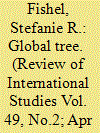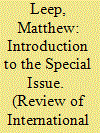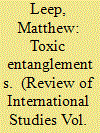|
|
|
Sort Order |
|
|
|
Items / Page
|
|
|
|
|
|
|
| Srl | Item |
| 1 |
ID:
193306


|
|
|
|
|
| Summary/Abstract |
Forest ecosystems are crucial to survival on Earth. This article argues that trees and forests are both vital components of a healthy Earth system and productive examples for expanding International Relations’ disciplinary boundaries. The article discusses the forest in three contexts: the global, the (post)colonial, and from the tree itself. From tree planting as a practice of social and environmental justice, to postcolonial and Indigenous science and knowledge, to the mycorrhizal ‘wood wide web’, a focus on trees, forests, and biosphere opens the possibility for a multispecies IR. Through a consideration of trees and forests in law, treaty, culture, and science at the local and global level, this article adds to a growing literature in IR that strives to bring the non-human, more-than-human, or other-than-human creatively and productively into the discipline. Foregrounding the forest's materiality and trees’ symbolic power for human cultures opens important pathways to understanding how the non-human is, and should, alter and affect global politics.
|
|
|
|
|
|
|
|
|
|
|
|
|
|
|
|
| 2 |
ID:
193304


|
|
|
|
|
| Summary/Abstract |
The contributions to this Special Issue examine multispecies perspectives on the political dynamics of international life. Building on this theme, I consider the complex and manifold ways in which the subject of security can be understood in terms of more-than-human personhood. First, by thinking of more-than-human animals as phenomenally conscious persons, we might better appreciate the multispecies complexity of security as an agentic and affective experience. Second, attending to the spiritual character of certain indigenous articulations of personhood presses us to decipher how spiritual claims might inform moral and legal dimensions of multispecies security-seeking behaviour. To illustrate the significance of these moves, I first draw on more-than-human experiences of war, pathogenic viruses, and the global factory farm. I then explore conceptions of spiritual personhood in the context of Ojibwe responsibilities to protect wolves. These perspectives on personhood demonstrate possibilities for cultivating greater interest in the multispecies experience of security.
|
|
|
|
|
|
|
|
|
|
|
|
|
|
|
|
| 3 |
ID:
193308


|
|
|
|
|
| Summary/Abstract |
This article explores avian experiences with toxic war processes that unfold across space and time. Joining together three evolving areas of interest in global politics – ontologies of war, interspecies relations, and sensory politics – the article develops a view of war that centres ongoing war processes that affect more-than-human life in and outside of international warzones. Advancing a multispecies form of inquiry attentive to local voices, including Upper Cook Inlet Tribes, the article examines how interspecies relations emerge in national security debates about long-lasting ecological costs of war. Specifically, it offers an analysis of US Department of Defense hearings surrounding the controversy over reopening Eagle River Flats – an Alaskan estuary that had been polluted with white phosphorus munitions – for weapons testing and training during the Iraq War. The article also considers the experiences of two migratory avian communities (northern pintails and tundra swans) with toxic white phosphorus pollution, illustrating more-than-human sensory perspectives on the space and time of war processes. These conceptual and empirical moves reposition national security concerns about wartime risk into a much broader post-anthropocentric perspective.
|
|
|
|
|
|
|
|
|
|
|
|
|
|
|
|
|
|
|
|
|